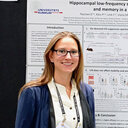
Enya PaschenUniversity Medical Center Freiburg · Department of Neurosurgery
Enya Paschen
Doctor of Philosophy
Looking for a new position
About
15
Publications
967
Reads
How we measure 'reads'
A 'read' is counted each time someone views a publication summary (such as the title, abstract, and list of authors), clicks on a figure, or views or downloads the full-text. Learn more
71
Citations
Publications
Publications (15)
Mesial temporal lobe epilepsy (MTLE), the most common form of focal epilepsy in adults, is often refractory to medication and associated with hippocampal sclerosis. Deep brain stimulation represents an alternative treatment option for drug-resistant patients who are ineligible for resective brain surgery. In clinical practice, closed-loop stimulati...
Background
Optogenetic tools allow precise manipulation of neuronal activity via genetically encoded light-sensitive proteins. Currently available optogenetic inhibitors are not suitable for prolonged use due to short-lasting photocurrents, tissue heating, and unintended changes in ion distributions, which may interfere with normal neuron physiolog...
One characteristic feature of mesial temporal lobe epilepsy is granule cell dispersion (GCD), a pathological widening of the granule cell layer in the dentate gyrus. The loss of the extracellular matrix protein Reelin, an important positional cue for neurons, correlates with GCD formation in MTLE patients and in rodent epilepsy models. Here, we use...
Mesial temporal lobe epilepsy (MTLE) is the most common form of focal, pharmacoresistant epilepsy in adults and is often associated with hippocampal sclerosis. Here, we established the efficacy of optogenetic and electrical low-frequency stimulation (LFS) in interfering with seizure generation in a mouse model of MTLE. Specifically, we applied LFS...
Background
Mesial temporal lobe epilepsy (MTLE) with hippocampal sclerosis (HS) is a common form of drug-resistant focal epilepsy in adults. Treatment for pharmacoresistant patients remains a challenge, with deep brain stimulation (DBS) showing promise for alleviating intractable seizures. This study explores the efficacy of low-frequency stimulati...
After ischemic stroke, the cortex directly adjacent to the ischemic core (i.e., the peri‐infarct cortex, PIC) undergoes plastic changes that facilitate motor recovery. Dopaminergic signaling is thought to support this process. However, ischemic stroke also leads to the remote degeneration of dopaminergic midbrain neurons, possibly interfering with...
Background
Electrical neurostimulation is a potentially effective therapy in epilepsy but the optimal approach is not yet clear. The parameter space is wide and the effects of different stimulations are not immediately obvious. Functional MRI (fMRI) can reveal which brain areas are affected by stimulation and help understand the induced effects. Ho...
Mesial temporal lobe epilepsy (MTLE), the most common form of focal epilepsy in adults, is often refractory to medication and associated with hippocampal sclerosis. Deep brain stimulation represents an alternative treatment option for drug-resistant patients who are ineligible for resective brain surgery. In clinical practice, closed-loop stimulati...
The performance of available optogenetic inhibitors remains insufficient due to low light sensitivity, short-lasting photocurrents, and unintended changes in ion distributions. To overcome these limitations, a novel potassium channel-based optogenetic silencer was developed and successfully applied in various in vitro and acute in vivo settings (Be...
Mesial temporal lobe epilepsy (MTLE) is the most common form of focal epilepsy in adults and is typically associated with hippocampal sclerosis and drug-resistant seizures. As an alternative to curative epilepsy surgery, brain stimulation evolves as a promising approach for seizure-interference. However, 35 particularly in MTLE with severe hippocam...
Mesial temporal lobe epilepsy (MTLE) is the most common form of focal epilepsy in adults and is typically associated with hippocampal sclerosis and drug-resistant seizures. As an alternative to curative epilepsy surgery, brain stimulation evolves as a promising approach for seizure-interference. However, particularly in MTLE with severe hippocampal...










































